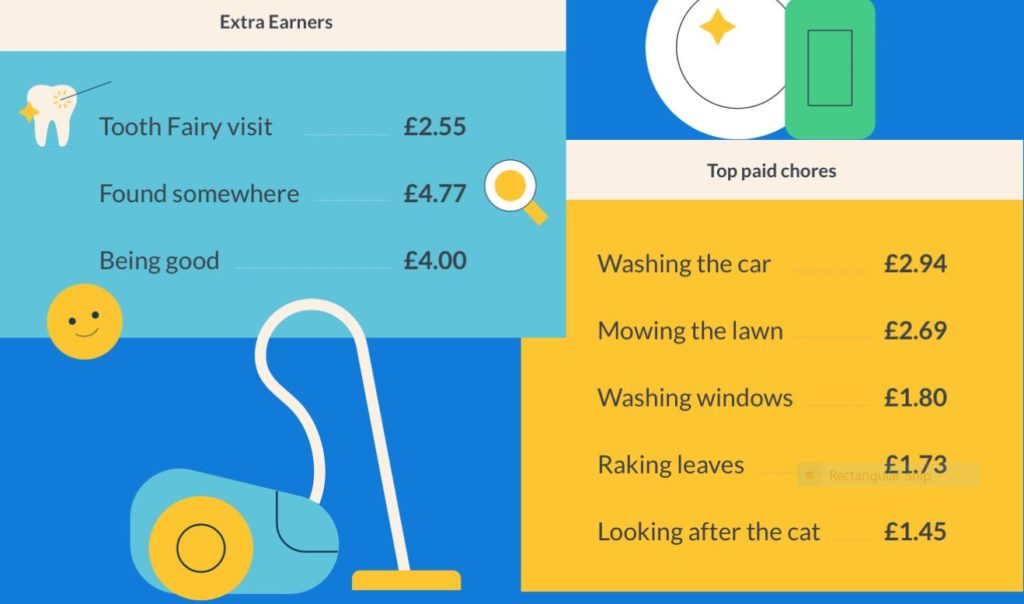When your child leaves the nest, you might look back with the hope that your child-rearing skills provided enough lessons on street smarts to get them by in this world. But as they venture off, another thought may come into your head: does my kid have money smarts? As a business owner or freelancer, what are you doing to create teachable moments to transform your child’s understanding of money – how it can be earned, saved and spent?
Our adult money habits are set by the age of 7, younger than most of us expect, according to research by the Money Advice Service. Parents and sometimes grandparents are the key influence on those habits. Therefore, the type of chores, the rates you set, and when and how those chores are completed could represent valuable life lessons. It could also mean the difference between a peaceful house or a battleground. Providing lessons on physical and digital money (how one is no less valuable than the other) is also very important.

Chores. Do your kids roll their eyes or flop onto the floor into a tantrum as soon as that word leaves your mouth? Or do their eyes widen in pound signs, that they are being offered a money-earning opportunity to save up for Fortnite, Roblox, Lego or a new outfit? That depends on how you, as a parent, spin in it. Chores are not punishment, they are a life lesson and a means to get what kids and parents want.
You may want to gauge how your kids’ chores stack up to other households in the UK. Are your chores fair when it comes to the time spent? Is it age-appropriate? Are you overpaying, especially if you are struggling between jobs or projects (yet again, a lesson is in there)? Can there be a mix of paid and non-paying chores? Definitely. And how can you avoid a ‘child labour’ dispute over the dinner table?
“We believe the world would be a better place if we all started having positive conversations about money earlier on in life,” says Will Carmichael, CEO of RoosterMoney, a pocket money app that helps parents teach their children about money in a ‘digital age’.

The app’s mission is to transform the way the world talks about money with their children. Rooster has also come out with an annual kids’ allowance report to highlight average chores, chore rates and how kids are spending their money. This year, Roblox, Fortnite and Lego, in that order were the top three big items kids spent their allowance on in 2020.
The app differentiates between money earned, money gifted and money saved and spent through chores, which are each priced at a certain rate chosen by the parent (or negotiated by your budding kidprenuer). Goals can also be added for a special item or experience. Chores can even be traded between siblings. Just make sure that one eager child is not taking over too many chores, otherwise, another child will be losing out on their financial education.

It would seem dog-owning families shell out a slightly higher rate (£1.93) for feeding man’s best friend than cat-owning families (£0.93), according to Rooster’s report. But nothing was reported about emptying the cat’s litter box or cleaning up after the dogs’ mess out in the garden, which could incur higher charges all around. Some children may be too young to take on such a chore, but when they are at a suitable age and understand the ins and outs of ‘health and safety’ for this particular task, (i.e., perhaps wearing disposable gloves, avoid touching their eyes, etc.) then it should be seriously considered.
“Families can start using the app as a star or reward chart, then graduate to a pocket money tracker before moving on to the Rooster Card when they are ready,” according to RooserMoney.
“We take children from their first steps in understanding the value of money (from as young as 4) to the point when they have the confidence and fundamentals needed to take control of their own bank account.”
Rooster’s website has an education section for parents to turn to for fun ideas to get kids really thinking about how their money is earned, saved and spent. Their pricing ranges from free, which provides a virtual tracker for the younger ones, aged 3 plus, then runs from £14.99 a year for Rooster Plus, then for those that are independent and spending online or in shops, there is the Rooster Card, which costs £24.99 a year which is about £2.08/month. There is a charge of £19.99 a year for additional cards.
Other pocket money and money apps you and your kids may want to check out include Gohenry, Nimbl, and Osper.
Fuss-free chore tips
The reason kids don’t like doing chores is the same reason adults don’t like doing chores: they are generally boring. “Instead, they pout, procrastinate, and drag their feet all to avoid 20 or 30 minutes of what is relatively easy work,” according to a report by Empoweringparents.com.
The report offers some tips to get your kids to get the job done. Their underlying message is that the choice shouldn’t be excitement or chore. The choice should be boredom or chore. The Freelance Informer has also added a few tips.
1. Earn privileges rather than have them taken away
In the real world, people do not earn a paid holiday before they put in the work, so kids should by the same token earn their screen time or other favoured activity by doing chores first.
2. End the Distractions until chores are done
If you often hear, “I’ll do it later,” and you let your kids put off their chores, what are you teaching them? Will they get away with that in the workplace or with their homework assignments when they become overdue? A sure-fire way to get chores done is to follow Step One, followed by Step Two – pull the plug on the electronics or phone until chores are complete.
3. Set clear deadlines
With busy family schedules, parents have to set deadlines for chores. Whether it means ‘please finish washing the dishes or unloading and putting the dishes away in 20 minutes’ before you can do X activity. Or for example, ‘make sure you have raked the leaves before Saturday to earn your pocket money in time for that Fortnite update’. The real world has deadlines so kids should learn that early in life.
4. Don’t Use Chores as a Punishment
“Don’t use chores as a punishment or as a consequence,” said Empowering Parents. “If somebody misbehaves and does something wrong, don’t give them a consequence of doing the dishes, for example. You want your child to learn that a chore is an expected responsibility to be done no matter what.”
5. Not all chores should be paid
Not all chores should be paid and these should be clearly identified. The last thing you want is a little extortionist on your hands anytime you need a helping hand. A thank you hug or high five and some praise can go a long way. Plus, the occasional thank you in the form of a family favourite meal (which they can help prepare) can go a long way.




I’m more than happy to discover this website. I need to thank you for your time for this, particularly a fantastic read!! I liked every little bit of it and I have you bookmarked to look at new information on your website.